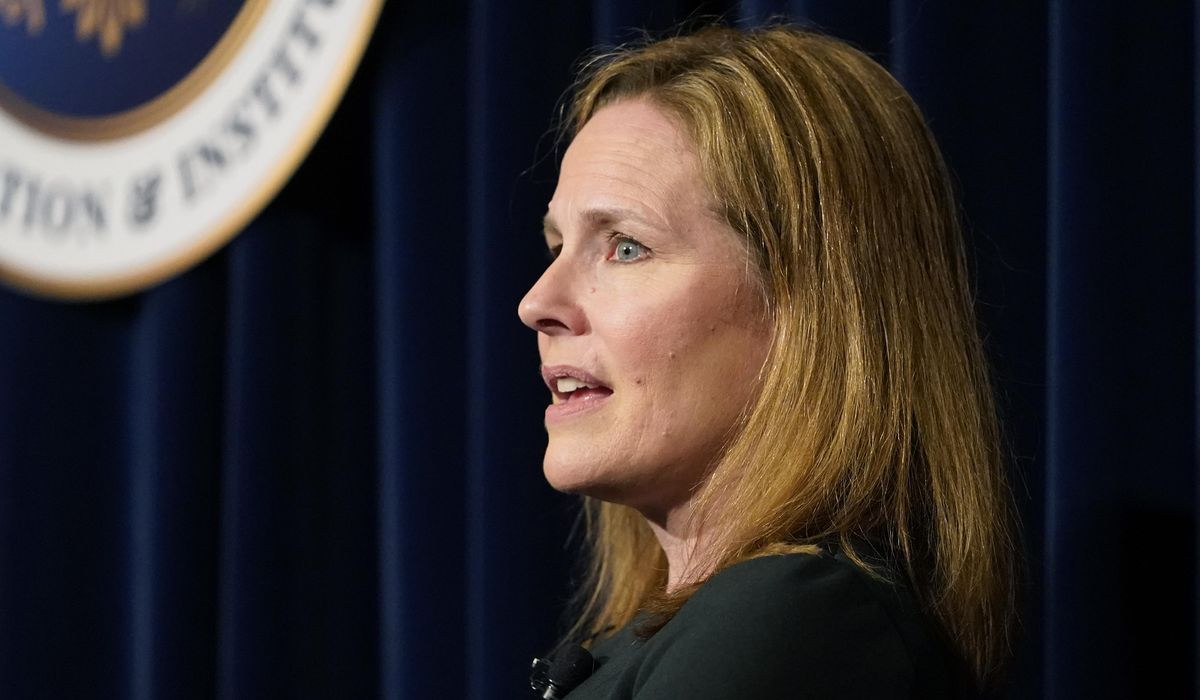


Supreme Court Justice Amy Coney Barrett defends her decision to overturn abortion rights nationwide in a new book coming out this month.
In “Listening to the Law,” published by the conservative Sentinel imprint of Penguin Random House, the Trump appointee also details some of the workings of the Supreme Court, according to a manuscript shared exclusively with CNN.
Justice Barrett also explains how she can be a woman of faith but still decide cases based on the law — pointing to the death penalty as an example.
Abortion
Justice Barrett, who joined the bench in 2020 after the death of Justice Ruth Bader Ginsburg, said Roe v. Wade, the 1973 landmark case that gave women a national right to abortion, was an “exercise of raw judicial power.”
Justice Barrett went on to echo the majority opinion that Roe had been wrongly decided, so the court could buck its usual course to follow precedent.
“The evidence does not show that the American people have traditionally considered the right to obtain an abortion so fundamental to liberty that it ’goes without saying’ in the Constitution. In fact, the evidence cuts in the opposite direction. Abortion not only lacked long-standing protection in American law — it had long been forbidden.”
Justice Barrett, according to CNN, notes that a “complicated moral debate” around abortion doesn’t seem to touch other rights more supported by the public, such as “the rights to marry, have sex, procreate, use contraception.”
Supreme Court
Justice Barrett shares that she was often frustrated with the high court’s opinions before joining it, suggesting some of the rulings left many unanswered questions.
“Before I joined the Court, I was sometimes frustrated by an opinion’s cryptic language or its failure to resolve fairly obvious points,” she wrote. “Now I better appreciate that glossing over issues is often deliberate.”
She said the justices try to agree on a key aspect, but narrow the opinion if they don’t agree on broader or surrounding matters.
“Skirting issues is sometimes the price of finding common ground — though it’s frustrating to delete points I’d like to make.”
“The best days are when ’join’ memos come in quickly and without requests for changes,” Justice Barrett wrote, according to CNN. “Once, when other justices quickly joined a particularly tricky opinion of mine, my chambers celebrated with an impromptu bottle of champagne. More often, there are at least a few requested edits — some simple and others requiring significant work. The latter requests are not an occasion for champagne, because after the effort of producing the opinion, reworking it is painful.”
Faith
Justice Barrett opens up about her contentious 2017 confirmation hearing to becoming a judge on the 7th Circuit Court of Appeals when the late Democratic Sen. Dianne Feinstein of California — whom she doesn’t name in the book — questioned her Catholic faith, saying the “dogma lives loudly within you” when quizzing her on how she would rule on cases.
Critics suggested the senator’s question presented an unlawful religious test for judges.
“Some suggest that people of faith have a particularly difficult time following the law rather than their moral views. (I faced that criticism as a Catholic, most sharply when the Senate Judiciary Committee conducted a hearing to consider my nomination to the Seventh Circuit.) I’m not sure why,” Justice Barrett wrote, CNN reported.
“Fortunately for the health of our country … people of faith are not the only Americans with firm convictions about right and wrong. Nonreligious judges also have deeply held moral commitments, which means that they too face conflicts between those commitments and the demands of the law.”
She pointed to her vote to reinstate the death penalty for Boston bomber Dzhokhar Tsarnaev even though she personally opposes the death penalty.
“For me, death penalty cases drive home the collision between the law and my personal beliefs. … Swearing to apply the law faithfully means deciding each case based on my best judgment about what the law is. If I decide a case based on my judgment about what the law should be, I’m cheating.”
• Alex Swoyer can be reached at aswoyer@washingtontimes.com.
